Blackbird Dares You to Call It a Love Story
“Why aren’t you happy? You should be happy.”
This simple question is the catalyst for the broken, abusive relationship that takes center stage in David Harrower’s Blackbird, now playing at the Belasco Theatre in New York City.
This is not a show for those looking for a lighthearted night at the theatre. It challenges and poses questions that many would prefer to ignore. Knowing the plot, I walked into the theatre not quite sure what to expect, and I left in a similar, if very different, state of unbalance.
I walked into the theatre not quite sure what to expect, and I left in a similar, if very different, state of unbalance.
The play takes place within the dreary, fluorescent confines of an office building. Stereotypical down to the numbered rooms and the humming vending machine in the corner, the set, designed by Scott Pask, fully embodies the mundane of the corporate world.
Once the lights dim, a turntable slowly turns the office walls until we are introduced to a filthy break room. A long table and plastic chairs are covered in leftover food, wrappers, and bottles, and an overflowing trash can sits off to the side. There is only a moment to take this in before the two stars rush into the room, one dragging the other, and thus our ninety-minute encounter begins.
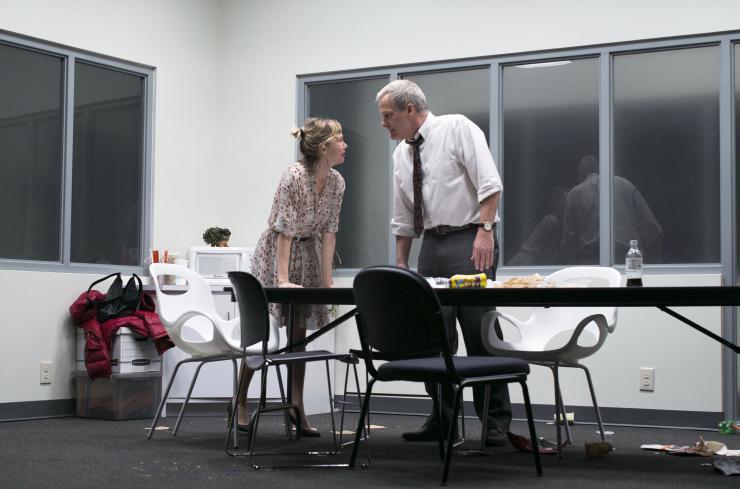
The story focuses on a meeting between an abuser and his victim fifteen years after their last encounter. The woman is now grown, and she has found the man who left an unforgettable mark on her at twelve years old. She sees his picture in a magazine and tracks him down for reasons that elude even her, and what takes place is an emotional and explosive reunion that leaves both participants even more broken than before.
Una (Michelle Williams), now in her twenties, shifts from being a tough, antagonist to a fragile girl who is breaking under her emotions. In the beginning she is righteous, taunting her former lover Ray (Jeff Daniels) with the power that she could break his charade of “Peter” (as he is now known) wide open with the truth. By revealing his affair with a minor, she could ruin everything he has created for himself. As the conversation progresses, Una slowly deteriorates into her twelve year old self, hopelessly in love with an older man. She learns revelatory truths that completely unhinge the foundation she has built her hate on, and she finds herself torn between lashing out and seeking Ray’s approval. It is this internal conflict that keeps the audience in rapt attention, and it is impossible to look away.
There is a moment where Una precisely dictates her memory and feelings concerning the last, and only, night she and Ray spent together. Her blind faith in Ray and his attention fueled a child’s naiveté as she waited and waited for him to return after leaving to buy cigarettes. She explains how her doubt and confusion were slow to creep in, and she was convinced something must have happened to keep him from her. This fear sends her running across town until she is eventually found and returned to her parents. Thus begins her haunting retelling of her treatment following Ray’s abandonment. As she is interrogated by parents and police alike, she insists that Ray never touched her. That he was only following her whim of wanting to run away. Yet no one believes her. She is forced to testify in a trial against Ray, and the judge rules that she had “suspiciously adult yearnings,” marking her forever as soiled and different.
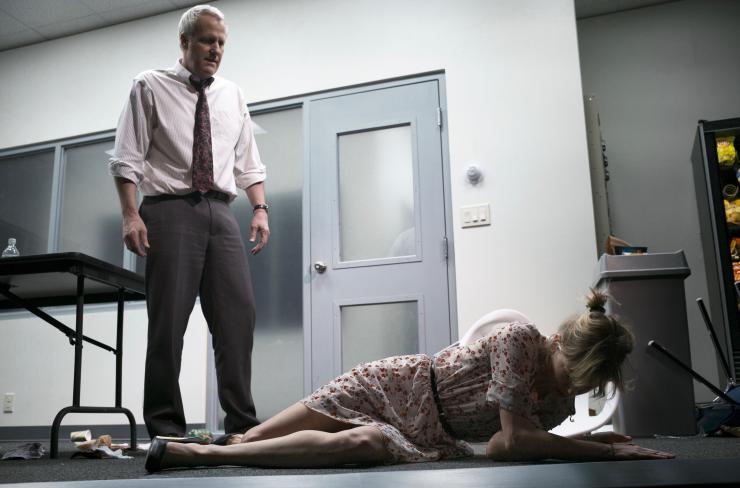
Una’s youth and tortured past is evident in Michelle Williams’ performance, and it is difficult to witness her puzzling out her feelings for Ray. Flashing between hate and need, her emotions are all over the place as she goes from provoking Ray to blaming him for being happy. She mocks him. Frantic and tense, Williams’ gestures and stature show the inner turmoil Una is experiencing, and it is hard not to be moved by her gradual breakdown.
Ray, now known as Peter, starts out anxious and fearful of being found out. “I don’t have to be here, you know.” He keeps reminding Una. He flinches at each coworker that walks by the break room’s frosted windows, terrified that Una will betray him. They are soon forgotten as Ray is caught up in the same emotional journey as Una. Despite his protests, he is moved from denial to anger to compassion to lust within the show’s single act, and Jeff Daniels is phenomenal as he rides each wave of emotion. Daniels is subtle in his performance, and I was shocked at how easy it was to thoroughly believe he was Ray. In denial, Ray insists that he is not “one of them”—he is not a child molester. In so doing, Ray struggles to maintain his identity. Unlike “them,” he has not loved nor desired a minor since Una, reinforcing her belief that she is special in some way. He implies she was and is irreplaceable in his life, much like his role in hers, and both are reminded of the connection they had fifteen years ago.
Jeff Daniels brings an uncanny level of believability to Ray, likely due to his having played the role back in 2007 at Manhattan Theatre Club. In his February interview with Vogue, Daniels talks about what drew him back to this complicated, unsavory role. Mentioning Ray’s insistence that he is different than a child molester, he poses the question of whether or not Ray is just a “guy who happened to fall for a twelve-year-old girl.” Daniels is more than willing to investigate this disturbing line of thinking, and it is uncomfortable, while also enthralling, to see him fully delve into this character’s psyche to bring forth an empathetic performance.
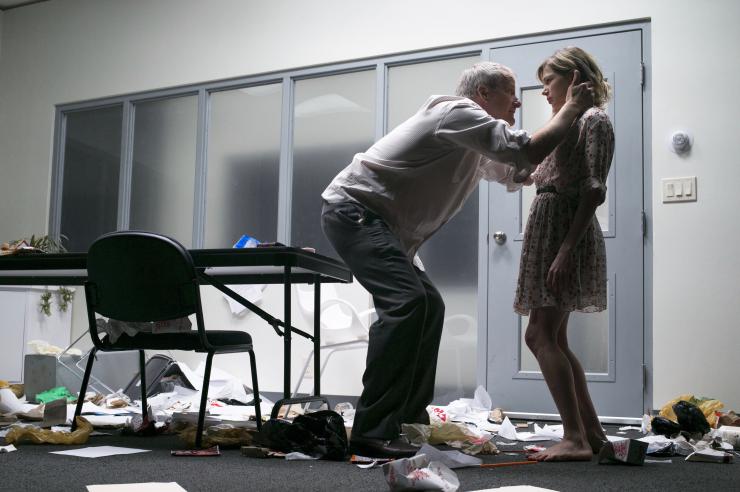
Director Joe Montello has allowed these actors to make the most of a very limited space. Despite the play taking place in a single cramped room, the movement between Ray and Una speaks to their tumultuous relationship. There are times where Ray sits hunched in his seat, trying his best to ignore Una. He frantically collects Una’s things, desperate for her to leave, all the while Una boldly confronts him. They throw trash around the room in the play’s single moment of playfulness. Each character’s movements speak to their inner struggle, and Montello has utilized their talents to effectively move the story to its emotional end.
Was this a love story? Were Ray and Una, despite the obstacles of age and societal shame, meant to be together? What did they find in each other that they are still seeking fifteen years later?
The beauty of Blackbird is that it manages to do so much with so little. The show is carried by these two people and their story and nothing else. They alone occupy the stage and yet the ninety minutes pass in a blur. After the bows and clapping were over, I left the theatre with unanswered questions. Was this a love story? Were Ray and Una, despite the obstacles of age and societal shame, meant to be together? What did they find in each other that they are still seeking fifteen years later? It is well worth the trip to find out.

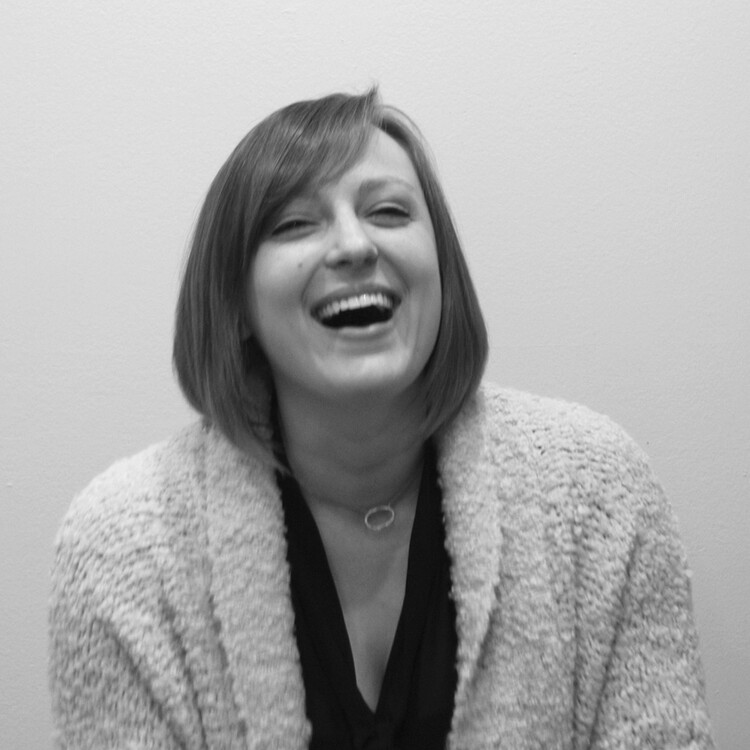
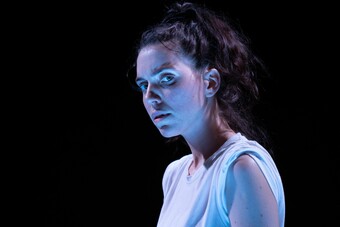



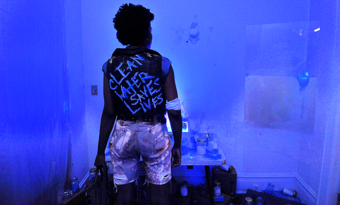

Comments
The article is just the start of the conversation—we want to know what you think about this subject, too! HowlRound is a space for knowledge-sharing, and we welcome spirited, thoughtful, and on-topic dialogue. Find our full comments policy here